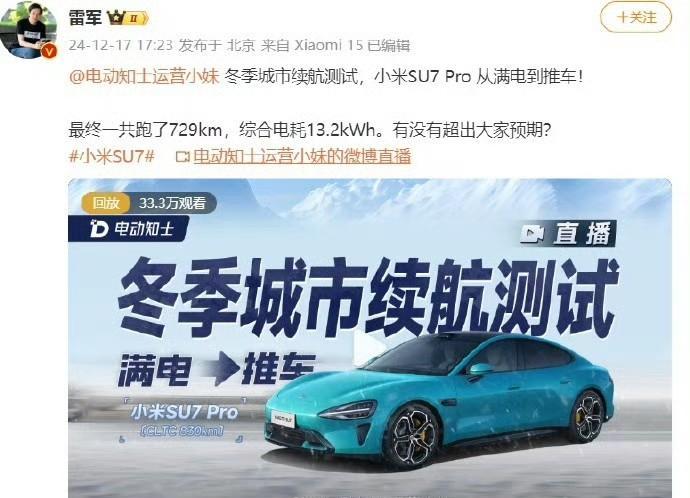SU7 Pro Winter Range Test Stirs Debate
An official test of Xiaomi’s SU7 Pro electric vehicle showed 729km range and 13.2kWh/100km energy consumption in winter conditions, sparking discussions about real-world performance and testing methodology.

The recent winter range test of Xiaomi’s SU7 Pro in China has become a focal point of discussion in the automotive community. According to the test conducted by Electric Knight, the vehicle achieved a remarkable 729km range with an average energy consumption of 13.2kWh/100km under winter conditions ranging from -2°C to 8°C.
The test was conducted under specific conditions: the vehicle carried 2-3 passengers (approximately 200kg), maintained cabin temperature at 24°C in automatic mode, and traversed various road types including Beijing city roads, highways, and expressways. The test demonstrated an 87.83% range efficiency compared to the official 830km rating.
However, the test results have sparked considerable debate among automotive experts and SU7 owners. Many owners report significantly different real-world experiences, with typical winter consumption ranging from 15-20kWh/100km. Several factors influence these variations:
Current SU7 Pro owners report daily ranges between 500-600km in winter conditions, significantly lower than the test results. They emphasize that real-world performance depends heavily on driving habits, climate control usage, and ambient temperature.
The energy consumption differences can be attributed to several key factors:
- Heating system power consumption in cold weather
- Battery thermal management system operation
- Driving speed and style variations
- Climate control settings
- Seat and steering wheel heating usage
Industry experts note that while the SU7’s thermal management system performs well compared to competitors, achieving such efficient performance requires optimal conditions and careful driving techniques that may not reflect typical usage patterns.
Automotive professionals argue that while the test results are technically achievable, they represent ideal conditions rather than everyday scenarios. The testing methodology followed a specific protocol designed to maximize efficiency, including maintaining steady speeds and optimizing energy recovery.
The discussion highlights the broader challenge of winter range performance in electric vehicles, where most models typically experience 20-30% range reduction in cold weather. The SU7’s performance, while impressive in controlled testing, still faces the fundamental physics of battery chemistry and thermal management in cold conditions.
This winter range test has contributed valuable data to the growing body of knowledge about electric vehicle performance in cold weather, while also highlighting the importance of setting realistic expectations for everyday users who may experience different results based on their specific usage patterns and local conditions.